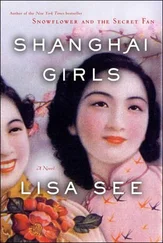Lisa See - Peony in Love
Здесь есть возможность читать онлайн «Lisa See - Peony in Love» весь текст электронной книги совершенно бесплатно (целиком полную версию без сокращений). В некоторых случаях можно слушать аудио, скачать через торрент в формате fb2 и присутствует краткое содержание. Жанр: Старинная литература, на английском языке. Описание произведения, (предисловие) а так же отзывы посетителей доступны на портале библиотеки ЛибКат.
- Название:Peony in Love
- Автор:
- Жанр:
- Год:неизвестен
- ISBN:нет данных
- Рейтинг книги:4 / 5. Голосов: 1
-
Избранное:Добавить в избранное
- Отзывы:
-
Ваша оценка:
- 80
- 1
- 2
- 3
- 4
- 5
Peony in Love: краткое содержание, описание и аннотация
Предлагаем к чтению аннотацию, описание, краткое содержание или предисловие (зависит от того, что написал сам автор книги «Peony in Love»). Если вы не нашли необходимую информацию о книге — напишите в комментариях, мы постараемся отыскать её.
Peony in Love — читать онлайн бесплатно полную книгу (весь текст) целиком
Ниже представлен текст книги, разбитый по страницам. Система сохранения места последней прочитанной страницы, позволяет с удобством читать онлайн бесплатно книгу «Peony in Love», без необходимости каждый раз заново искать на чём Вы остановились. Поставьте закладку, и сможете в любой момент перейти на страницу, на которой закончили чтение.
Интервал:
Закладка:
I was seeing. Only when I realized Mama couldn’t take more than ten steps without swaying did I accept the truth. My mother was dead and roaming, only she didn’t know it.
We came to my family’s Moon-Viewing Pavilion, I helped her up, and then I joined her.
“I remember this place. I used to come here with your father,” Mama said. “But you shouldn’t be here, and I should get back. I need to put out New Year offerings.” Again confusion settled over her features. “But those are for ancestors and you’re—”
“A ghost. I know, Mama. And this is not New Year.” She had to have died very recently, because her confusion was still so powerful and complete.
“How can that be? You have an ancestor tablet. Your father had one made, even though it goes against tradition.”
My tablet . . .
Grandmother had said I couldn’t do anything to get it dotted, but maybe I could get my mother to help me.
“When did you last see it?” I asked, trying to keep my voice neutral.
“Your father took it with him to the capital. He couldn’t bear to be parted from you.”
I formed the sentences to tell her what had actually happened, but as hard as I tried, the words wouldn’t come out of my mouth. A terrible feeling of helplessness washed over me. I could do many things but not this.
“You look exactly the same,” Mama said, after a long while, “but I see so much in your eyes. You’ve grown. You’re different.”
I saw a lot in her eyes too: desolation, resignation, and guilt.
we staye d i n the Moon-Viewing Pavilion for three days. Mama didn’t say much and neither did I. Her heart needed to settle so she would understand she was dead. Gradually she remembered getting the feast for hungry ghosts ready and collapsing on the kitchen floor. Slowly she became aware of the other two parts of her soul, one waiting for burial, the other journeying to the afterworld. The third with me was free to roam, but Mama hesitated to leave the Moon-Viewing Pavilion.
“I don’t go abroad,” she said on the third night, as flower shadows trembled around us, “and you shouldn’t either. You belong at home where you’ll be safe.”
“Mama, I’ve been roaming for a long time now. Nothing”—I considered my words carefully—“physically bad has happened to me.”
( 2 1 2 )
She stared at me. She was still beautiful: thin, elegant, refined, but touched by sorrow so deep it gave her grace and dignity. How had I not seen this in life?
“I’ve walked to Gudang to see our mulberry groves,” I said. “I’ve gone on excursions. I’ve even joined a poetry club. Have you heard of the Banana Garden Five? We go boating on the lake. I’ve helped them with their writing.”
I could have told her about my project, how much I’d done on it and how my husband had received fame as a result. But she hadn’t known about it when I was alive and in death I’d pursued it so hard that I’d caused Ze’s death. Mama wouldn’t be proud of me; she’d be disgusted and ashamed.
But it was as if she hadn’t heard me at all when she said, “I never wanted you to go out. I tried hard to protect you. There was so much I didn’t want you to know. Your father and I didn’t want anyone to know.”
She reached into her clothes and fingered her hidden locks. My aunts must have placed them there when preparing her for burial.
“Even before you were born, I dreamed of you and who you would be,” she went on. “When you were seven, you wrote your first poem and it was beautiful. I wanted your talent to soar like a bird, but when it did I was frightened. I worried about what would happen to you. I saw your emotions were close enough to touch, and I knew you would have little happiness in life. This is when I realized the real lesson of the Weaving Maid and the Cowherd. Her gift of cleverness and her ability at weaving did not put an end to her sorrow, it caused it. If she hadn’t been so good at weaving cloth for the gods, she could have lived forever with the Cowherd on earth.”
“I always thought you told that tale because it was romantic. I didn’t understand.”
A long silence followed. Her interpretation of the story was dark and negative. There were so many things I didn’t know about her.
“Mama, please. What happened to you?”
She looked away from me.
“We’re safe now,” I said, and gestured around us. We were in our family’s Moon-Viewing Pavilion, the crickets were singing, and the lake spread out cool and still before us. “Nothing bad can happen to either of us here.”
Mama smiled at that, and then she tentatively began. She reminisced about marrying into the Chen family and going on excursions with her ( 2 1 3 )
mother-in-law, about her writing and what it meant to her, and about collecting the works of forgotten women poets who had been writing for nearly as long as our country’s existence. I saw and felt everything as Mama spoke.
“Never let them tell you that women didn’t write. They did,” she said.
“You can go back more than two thousand years to the Book of Songs and see that many of the poems were written by women and girls. Should we assume that they produced those poems by merely opening their mouths and mindlessly spouting words? Of course not. Men seek fame with their words—writing speeches, recording history, telling us how to live—but we are the ones who embrace emotions, who collect the leftover crumbs of seemingly meaningless days, who touch on the cycles of life and remember what happened in our families. I ask you, Peony, isn’t that more important than writing an eight-legged essay for the emperor?”
She didn’t wait for an answer. I don’t think she even wanted one.
She talked about the days leading up to the Cataclysm and what happened when it arrived, and it all matched what my grandmother had told me. Mama stopped when they reached the girls’ lookout pavilion and she had gathered all the jewels and silver from the other women.
“We’d been so happy to be out,” Mama said, “but we didn’t understand that there is a big difference between choosing to leave our inner chambers and being forced out. We are told many things about how we should behave and what we should do: that we should have sons, that we should sacrifice ourselves for our husbands and sons, that it is better to die than bring shame on our families. I believed all that. I still do.”
She seemed relieved that she was finally able to talk about this, but she still hadn’t revealed what I wanted to know.
“What happened after you left the pavilion?” I asked gently. I took her hand and squeezed it. “No matter what you say or what you did, I’ll love you still. You’re my mama. I’ll always love you.”
She stared out across the lake to where it faded into mist and darkness.
“You were never married,” she said at last, “so you don’t know about clouds and rain. It was beautiful with your father—the building of the clouds, the rain that fell, the way we were together like one spirit, not two.”
I knew more about clouds and rain than I would ever tell my mother, but I didn’t quite understand what she was talking about.
“What the soldiers did to me was not clouds and rain,” she said. “It was brutal, pointless, and unfulfilling even for them. Did you know I was ( 2 1 4 )
pregnant then? You couldn’t know. I never told anyone except your father.
I was in my fifth month. The baby didn’t show beneath my tunic and skirts. Your father and I thought we’d take this one last trip before my confinement. On our last night in Yangzhou we were to tell your grandparents. That never happened.”
“Because the Manchus came.”
“They wanted to destroy everything that was precious to me. When they took your father and grandfather, I knew what my duty was.”
Читать дальшеИнтервал:
Закладка:
Похожие книги на «Peony in Love»
Представляем Вашему вниманию похожие книги на «Peony in Love» списком для выбора. Мы отобрали схожую по названию и смыслу литературу в надежде предоставить читателям больше вариантов отыскать новые, интересные, ещё непрочитанные произведения.
Обсуждение, отзывы о книге «Peony in Love» и просто собственные мнения читателей. Оставьте ваши комментарии, напишите, что Вы думаете о произведении, его смысле или главных героях. Укажите что конкретно понравилось, а что нет, и почему Вы так считаете.












